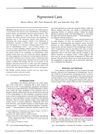 38 citations,
July 2021 in “ACS Nano”
38 citations,
July 2021 in “ACS Nano” Microneedles help treat hair loss by improving hair surroundings and promoting growth.
 34 citations,
September 2009 in “International Journal of Dermatology”
34 citations,
September 2009 in “International Journal of Dermatology” Using anabolic-androgenic steroids can cause skin problems like acne and hair loss in athletes.
[object Object]  32 citations,
March 2021 in “Journal of endocrinological investigation”
32 citations,
March 2021 in “Journal of endocrinological investigation” Thyroid hormones are important for skin health and changes in them can affect conditions like hair loss and eczema.
 32 citations,
December 2017 in “International Journal of Molecular Sciences”
32 citations,
December 2017 in “International Journal of Molecular Sciences” Low vitamin D might be linked to certain types of hair loss, and supplements could help, but more research is needed.
 26 citations,
August 2018 in “American Journal of Clinical Dermatology”
26 citations,
August 2018 in “American Journal of Clinical Dermatology” Hair loss in cancer patients can be related to the cancer itself, treatment, or other conditions, and understanding it is important for diagnosis and patient care.
 25 citations,
July 2021 in “Journal of Medical Virology”
25 citations,
July 2021 in “Journal of Medical Virology” COVID-19 can cause various skin issues, including rashes and hair loss, which usually heal on their own and don't always indicate severe illness.
 23 citations,
July 2018 in “BMC Complementary and Alternative Medicine”
23 citations,
July 2018 in “BMC Complementary and Alternative Medicine” Certain herbal combinations in traditional Chinese medicine might be effective for treating hair loss, focusing on liver or stomach health.
 22 citations,
July 2017 in “BMC complementary and alternative medicine”
22 citations,
July 2017 in “BMC complementary and alternative medicine” Natural remedies for hair and scalp issues are still widely used in Palestine.
 22 citations,
May 1999 in “International Journal of Dermatology”
22 citations,
May 1999 in “International Journal of Dermatology” Hair loss from genetics and hormones can be treated with drugs or surgery.
 20 citations,
November 2012 in “Journal der Deutschen Dermatologischen Gesellschaft”
20 citations,
November 2012 in “Journal der Deutschen Dermatologischen Gesellschaft” Hair diseases can have psychological effects and should be treated with a combination of psychosomatic care, therapy, and medication.
 19 citations,
January 2016 in “Dermatology Research and Practice”
19 citations,
January 2016 in “Dermatology Research and Practice” The study concluded that hair loss in Indian women is not significantly linked to anemia or thyroid problems, but checking thyroid function could help those with ongoing hair loss.
 16 citations,
July 2013 in “The American Journal of Dermatopathology”
16 citations,
July 2013 in “The American Journal of Dermatopathology” Pigmented casts are common in several hair loss conditions and can help diagnose specific types of alopecia.
14 citations,
December 2021 in “International journal of molecular sciences” Growth hormone levels affect hair growth and loss, with too much causing excess hair and too little leading to hair loss.
 14 citations,
October 2006 in “Journal of The American Academy of Dermatology”
14 citations,
October 2006 in “Journal of The American Academy of Dermatology” A woman with Parkinson's disease experienced hair loss from the Parkinson's medication pramipexole, which improved after stopping the drug.
 14 citations,
July 1987 in “Dermatologic Clinics”
14 citations,
July 1987 in “Dermatologic Clinics” The document concludes that treating female hair loss should target reducing excess androgen and blocking its effects on hair follicles, with the best treatments being hormonal therapy, adrenal suppression, and topical minoxidil.
 14 citations,
May 1987 in “Archives of Dermatology”
14 citations,
May 1987 in “Archives of Dermatology” Tissue expansion is an effective treatment for certain types of hair loss, providing immediate coverage with hair-bearing skin.
 13 citations,
February 2015 in “Actas Dermo-Sifiliográficas”
13 citations,
February 2015 in “Actas Dermo-Sifiliográficas” The document concludes that recognizing specific histological features of different nonscarring alopecias is crucial for accurate diagnosis and understanding hair loss progression.
 13 citations,
July 2001 in “International Journal of Dermatology”
13 citations,
July 2001 in “International Journal of Dermatology” Inflammation and Demodex mites might contribute to hair loss, and targeting them could help treat it.
 13 citations,
February 1999 in “International Journal of Cosmetic Science”
13 citations,
February 1999 in “International Journal of Cosmetic Science” Hair loss increases between July and October, possibly due to UV light, and factors like skin type, hair color, and density may affect this. Dandruff can worsen hair loss conditions.
 12 citations,
December 2016 in “International journal of nursing practice”
12 citations,
December 2016 in “International journal of nursing practice” Puerto Rican children with cancer often experience symptoms like irritability, nausea, and hair loss, and need better education and continuous symptom management.
 10 citations,
January 2015 in “Journal of Dermatology and Dermatologic Surgery”
10 citations,
January 2015 in “Journal of Dermatology and Dermatologic Surgery” Hair loss in adult females in Makkah is often linked to iron-deficiency anemia and thyroid issues.
[object Object]  10 citations,
January 2009 in “Elsevier eBooks”
10 citations,
January 2009 in “Elsevier eBooks” Hair growth is influenced by hormones and goes through different phases; androgens can both promote and inhibit hair growth depending on the body area.
 10 citations,
April 2000 in “Archives of Oral Biology”
10 citations,
April 2000 in “Archives of Oral Biology” Minocycline may cause hair loss by increasing DHT levels, but finasteride can help counteract this effect.
 9 citations,
July 2011 in “The Journal of Sexual Medicine”
9 citations,
July 2011 in “The Journal of Sexual Medicine” Hair loss drugs like finasteride may cause lasting sexual and mood side effects, and more research is needed to understand these risks.
 9 citations,
January 1992 in “Journal of Investigative Dermatology”
9 citations,
January 1992 in “Journal of Investigative Dermatology” Sugar molecule helps hair growth, less in balding, returns with treatment.
 8 citations,
May 2019 in “Indian Journal of Plastic Surgery/Indian journal of plastic surgery”
8 citations,
May 2019 in “Indian Journal of Plastic Surgery/Indian journal of plastic surgery” Plasma is better than Ringer's lactate for hair graft survival and growth after transplantation.
 8 citations,
March 2019 in “Progress in Human Geography”
8 citations,
March 2019 in “Progress in Human Geography” Hair significantly shapes body identity and social interactions, influencing how we perceive and relate to our bodies.
 8 citations,
October 2018 in “Applied sciences”
8 citations,
October 2018 in “Applied sciences” Alginate spheres help maintain hair growth potential in human cells for hair loss treatment.
 8 citations,
September 2015 in “Clinics in Dermatology”
8 citations,
September 2015 in “Clinics in Dermatology” Hair loss in children is diagnosed and treated differently than in adults, with different common causes and a focus on less invasive methods.
 8 citations,
January 1989 in “Annual Reports in Medicinal Chemistry”
8 citations,
January 1989 in “Annual Reports in Medicinal Chemistry” Hair loss from alopecia areata and androgenetic alopecia can be treated, but more effective and safer treatments are needed.





























